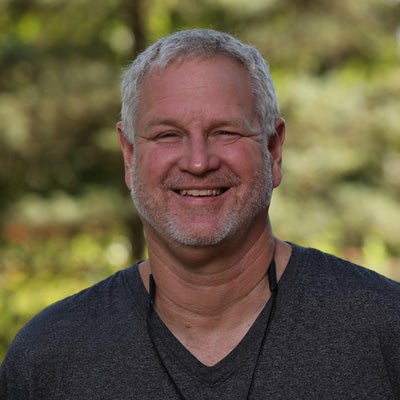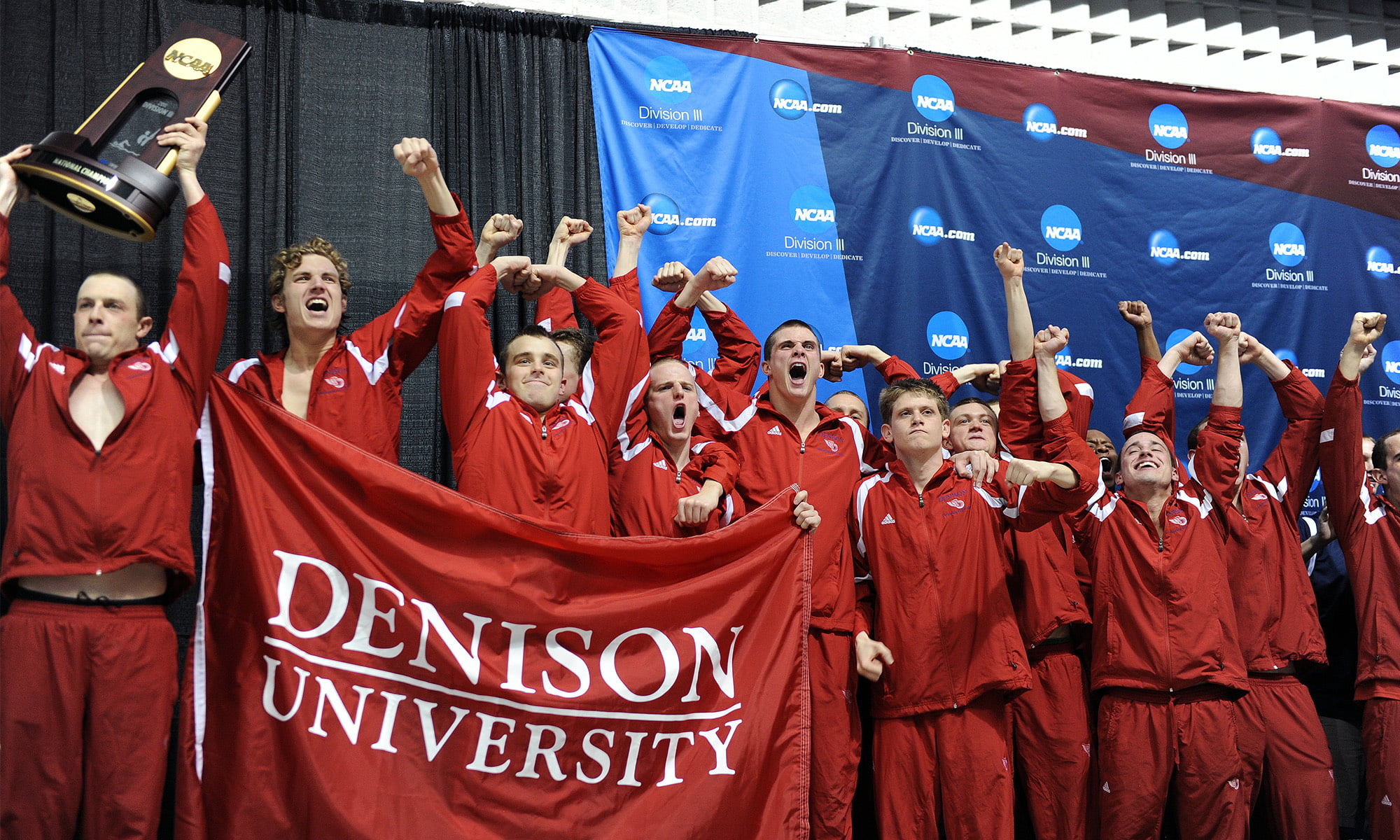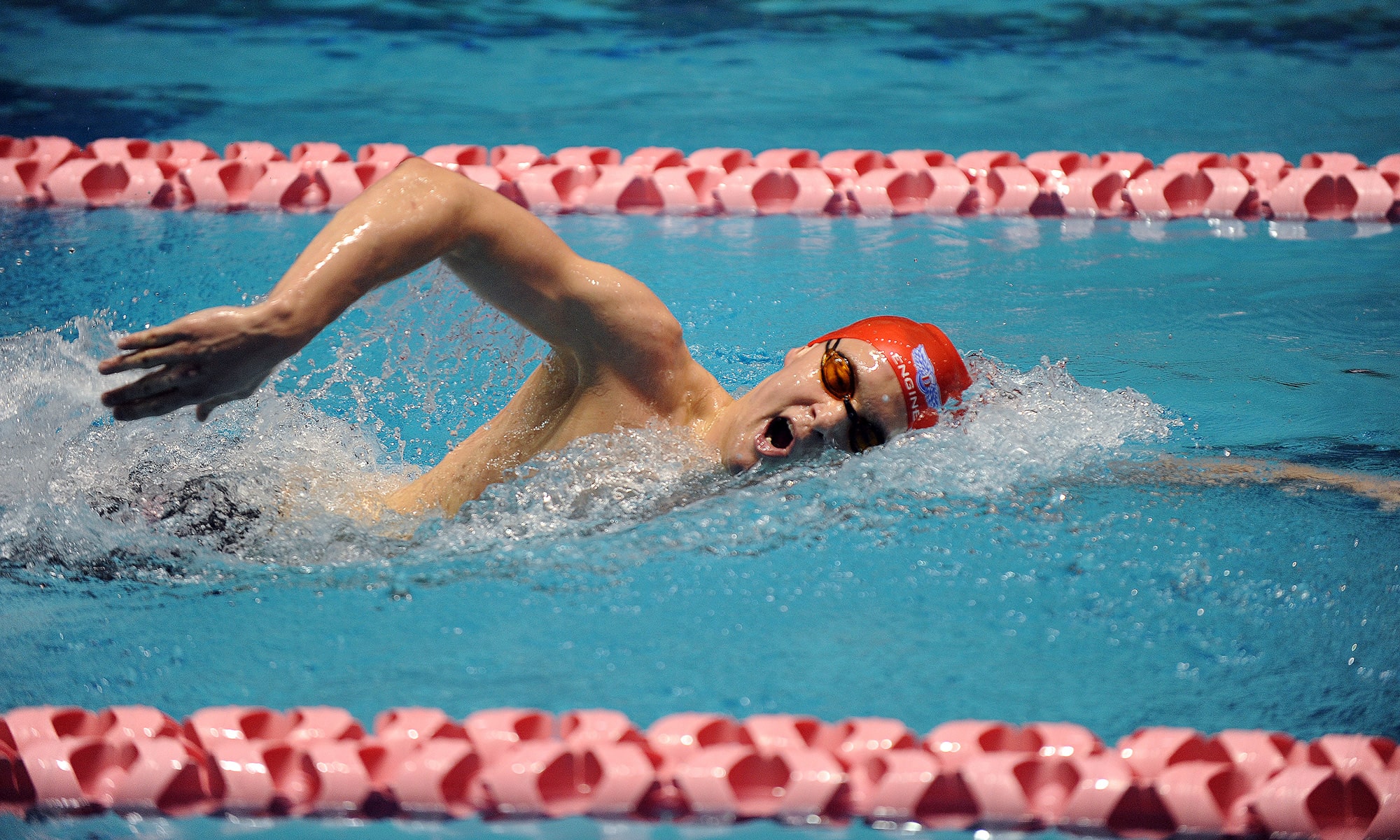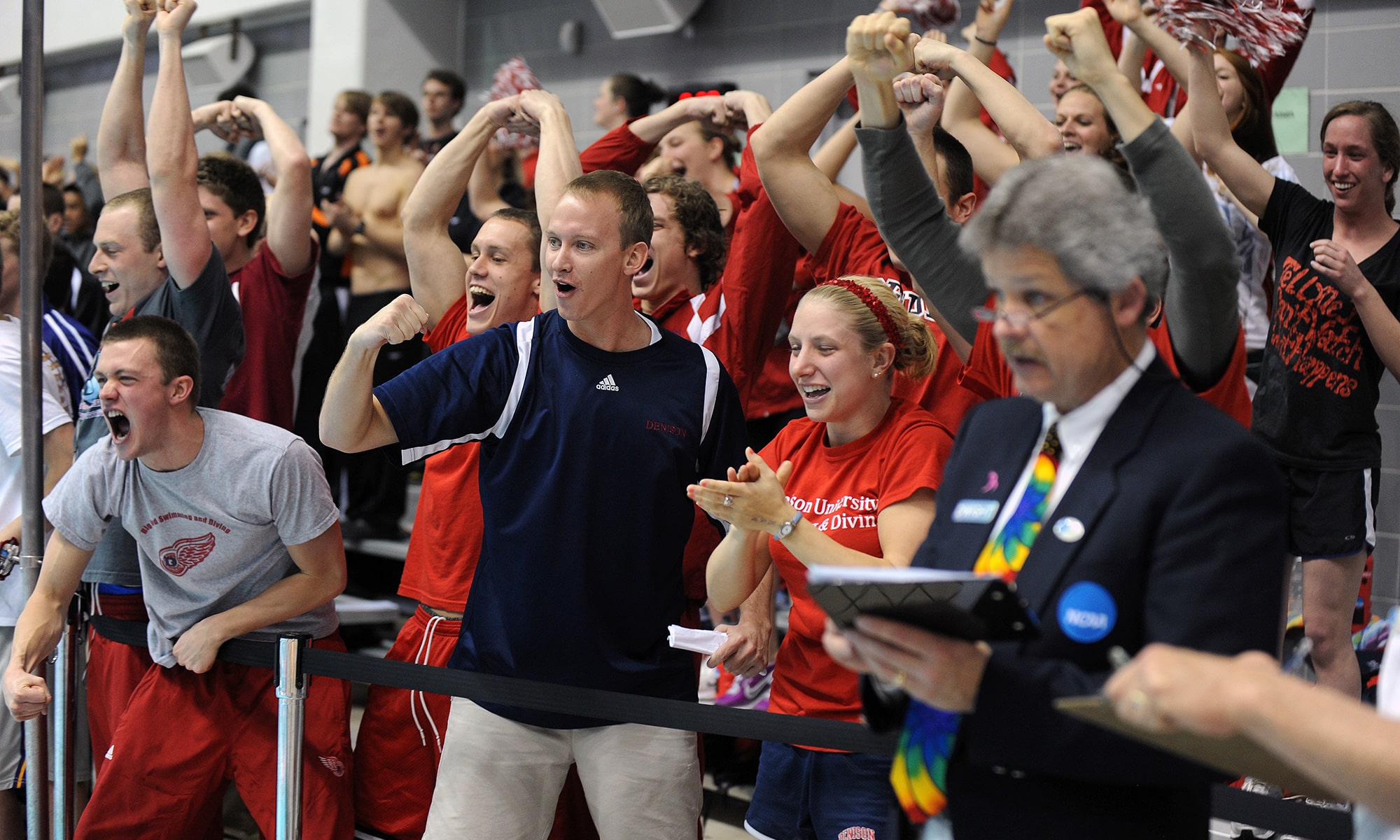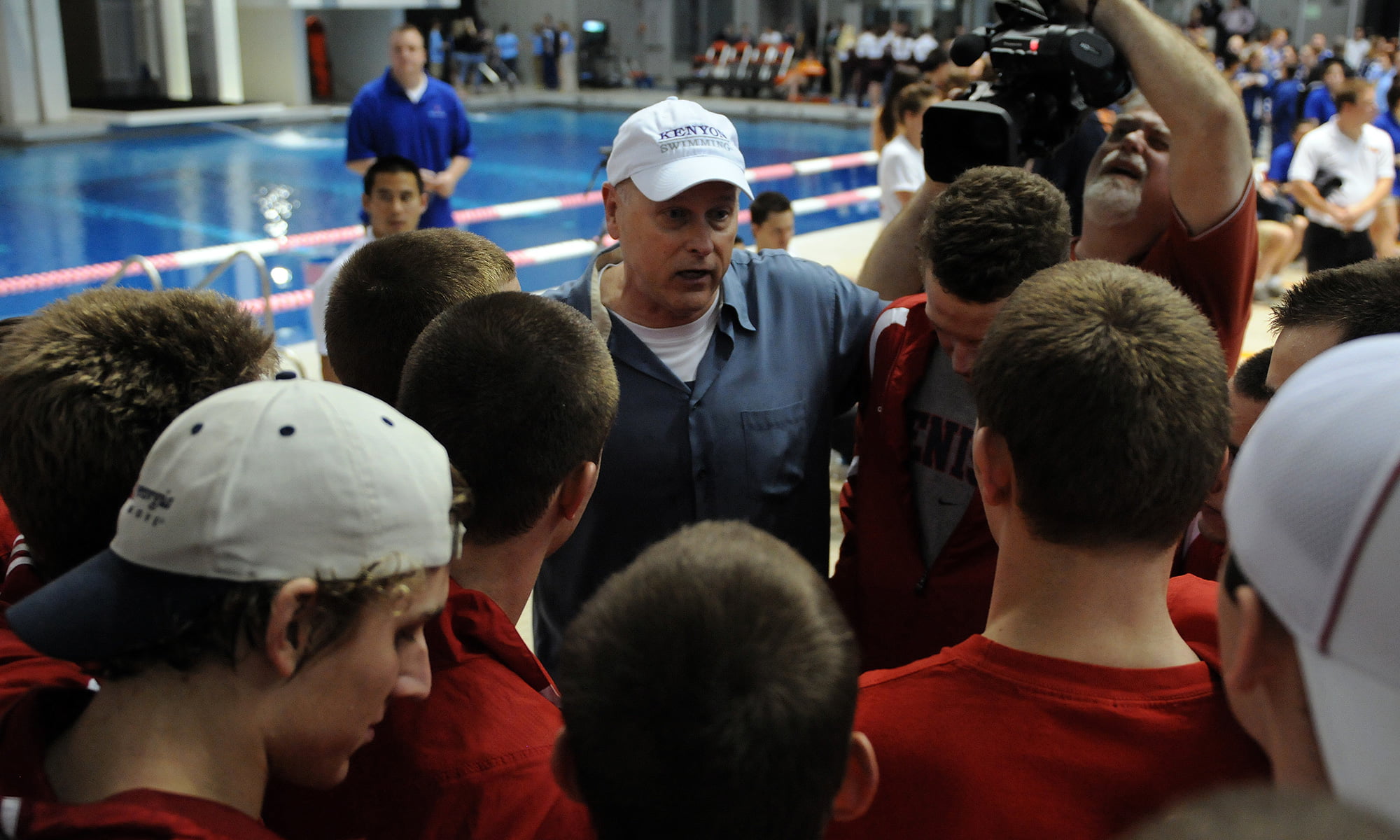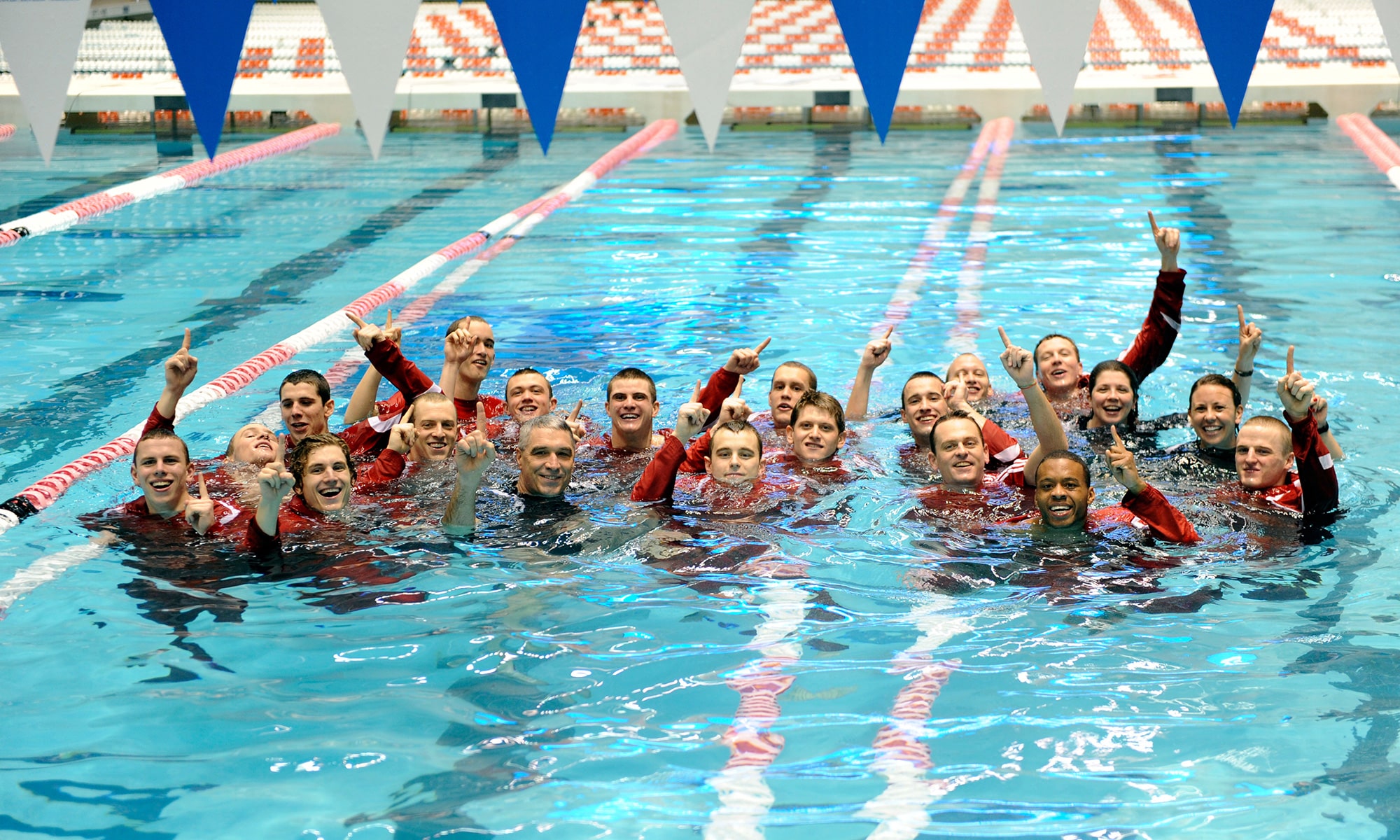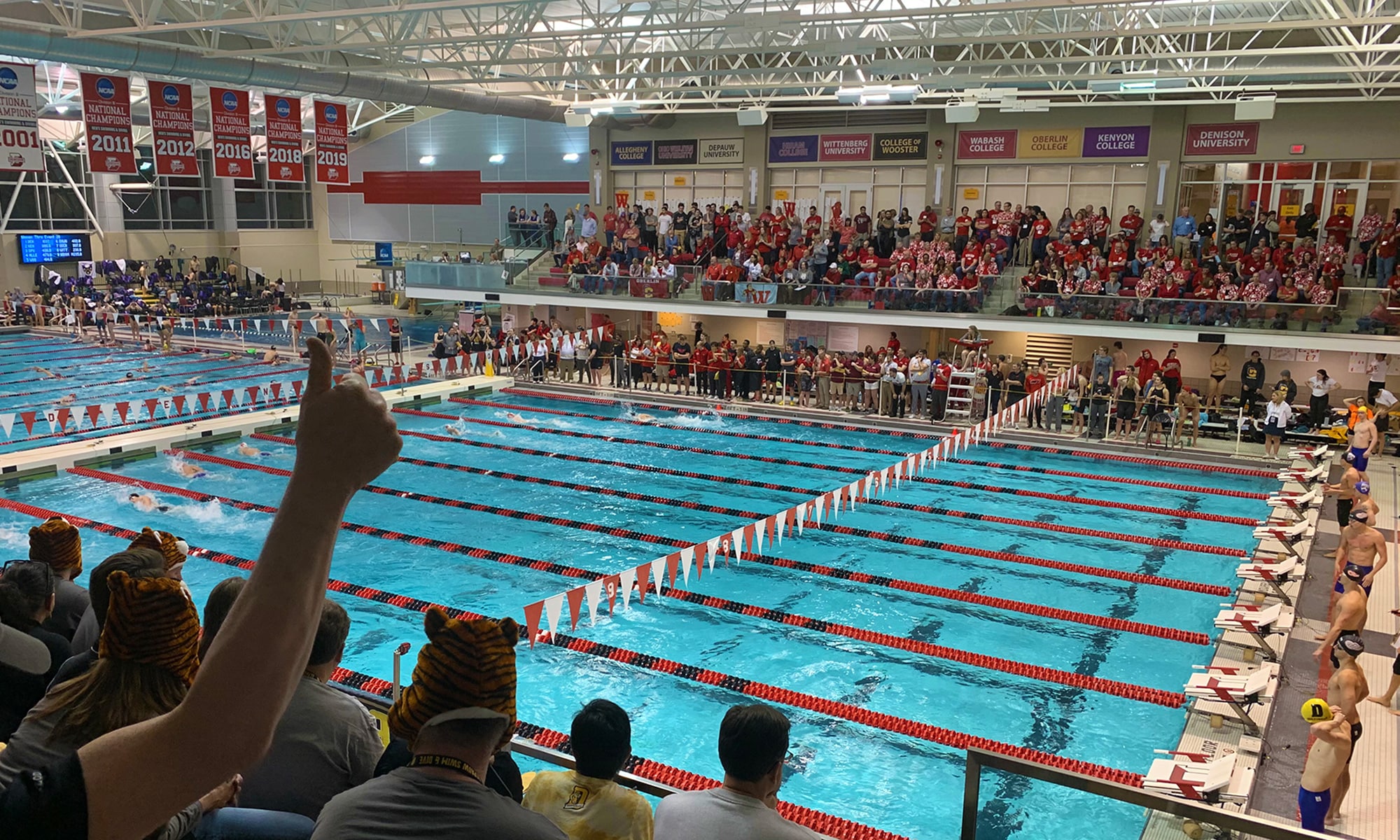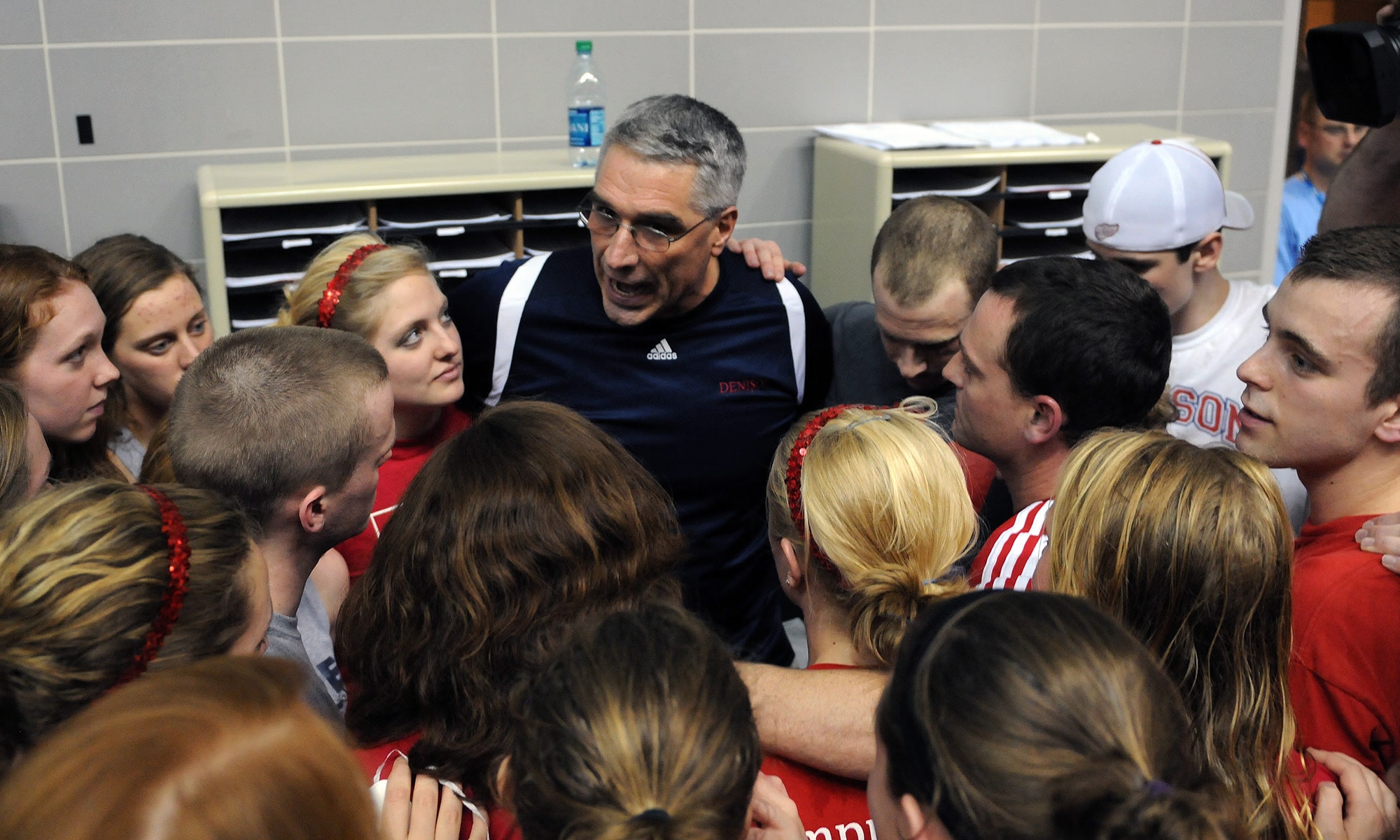On a night dedicated to past glories, Aaron Cole ’00 wanted to discuss the current state of men’s Division III swimming and diving.
It was Big Red Weekend in 2010 and Cole was being inducted into the Varsity D Association Hall of Fame. Among the university’s greatest swimmers, Cole kept his acceptance speech brief. He was more focused on addressing Denison’s 2010-11 team.
The message was direct and searing. It was time to deliver Denison’s first men’s national championship and end Kenyon College’s 31-year stranglehold on the NCAA title.
Don’t be afraid of failure, Cole told them.
Be afraid of being forgotten.
“My fear for you is somebody else will be the team that breaks Kenyon’s streak,” Cole said. “Because once that happens, nobody else will have that opportunity again.”
Al Weik, a first-year standout on Denison’s first NCAA men’s championship team, said his class was obsessed with beating Kenyon. “When we got together, all that we talked about was beating them. Most people go out and party on Saturday nights. We were sitting in our dorm rooms, hanging out, talking about beating Kenyon.”
During Big Red Weekend 2022, members of the 2010-11 team will return to campus to be honored by the swimming program.
This is the story, in their own words, of how Denison won one of the greatest swimming and diving meets in NCAA history.
Kenyon did not just beat contenders at NCAA meets — it demoralized them. The average margin of victory over Kenyon’s 31-year title run was 226.6 points. Denison finished second seven times in that span.
Michael DeSantis ’12: We finished runner-up to Kenyon the previous year by 424 points. That’s like reaching the NCAA basketball final and losing by 50.
Quinn Bartlett ’13: If you combined our score (272 points) and Emory’s third-place score (259.5 points), Kenyon still would have won.
George Kennedy (former Johns Hopkins coach): There was a mystique about Kenyon’s program. Every year, the feeling was that everyone else was fighting for second. And yet, I don’t think Gregg Parini felt that way.
Gregg Parini (Denison men’s and women’s coach): My old man told me, “You are too dumb to give up.” Most of the country had given up trying to beat them. My feeling was nobody has a monopoly on this title unless you give them permission.
DeSantis: We had our exit meetings after the 2010 meet and Gregg asked, “What can we do to narrow the gap? Let’s start chipping away.” He set the tone right there. The other factor was our incoming freshman class with guys like Al Weik ’14 and Spencer Fronk ’14, who ended up being the best recruiting class in team history.
Parini: Our guys worked their tails off to improve. They were sick of losing to Kenyon.
Cody Smith ’11: There are times you hear guys give a motivational speech, and you’re like, “Yeah, whatever.” But what Aaron Cole said resonated. Guys were putting it on Post-it notes in the locker room.
A delicious subplot to the Kenyon-Denison rivalry was that Parini helped Kenyon’s legendary coach Jim Steen win his first title in 1980 as a swimmer on the team.
Parini: I had great love and affection for my college coach, and I probably had him too high on a pedestal when I got to Denison. But by the time 2011 rolled around, it was like, “Why not us?”
Alice Parini (coach’s wife): Gregg had won an NCAA title with the women’s team in 2001, but with the men, he referred to it as “always the bridesmaid, never the bride.”
Steen: We had a target on our backs. We knew a lot of teams wanted to knock it off.
Parini: I had to look at my old coach in a different light. There’s quite a history between us. I’m sure there were times it got very confrontational on the pool deck — not just between the coaches, but between the athletes. There were a few times where it was like, “This could come to blows.”
DeSantis: We hated Kenyon. We still do. It’s all in good fun, and I don’t wish ill will on anyone who goes there. I just hope they never win again.
Cole: I have a 15-year-old son who refuses to wear purple. There’s nothing purple in my closet. It sounds silly, but that’s the level of competition that exists between the schools.
Bartlett: During the recruiting process, one of the Denison swimmers said if you go to Kenyon, you’ll swim for an amazing program. But if you come here, you could be part of the first team to beat Kenyon and if you go there, you might be part of the first team to lose.
Denison’s team enjoyed a tremendous 2010-11 season, winning the Kenyon Invitational and capturing the NCAC title. The Big Red carried that momentum into the four-day NCAA Championship in Knoxville, Tennessee.
Heading into the final day, Denison trailed Kenyon by just 35 points.
Cole: I was sending a ton of text messages to fellow alumni, and I was telling them, “You should get here. It could really happen. This feels different.”
DeSantis: Swimming can be a solitary sport. You can swim fast and do it for yourself. With that team, everyone bought in. Everyone was swimming for someone else, and it showed in that meet.
Weik: The family atmosphere was baked into that team, and I haven’t experienced anything like that since I left Denison.
Gabe Dixson ’13: You looked at our roster and it was like, wow, we have heavy hitters in multiple events. And as the season went along, there was a feeling of ‘We can do this, or at least we’re going to give it our damndest.”
Kenyon had an Achilles heel — it didn’t emphasize or excel in diving — but no opponent in NCAA meets could capitalize on that weakness. In 2011, Denison changed that as a victory from Weik in the 1650-meter race and a 1-2 finish from Barlett and Robert Barry ’12 in the 200-meter backstroke helped reduce the deficit to four points heading into the penultimate event, the 3-meter dive.
The Big Red had Smith and Dixson competing in the finals, needing a strong showing to give Denison a shot at the title.
Denison men’s and women’s swimmers cheer Al Weik to a win in the 1650-meter final. Weik’s time of 15:06.47 set a national record.
Bartlett: When a pitcher is throwing a perfect game, nobody in the dugout talks to him. That’s kind of how it was on the pool deck. We were gaining on Kenyon, but guys were just milling about with intense energy not knowing what to do with it. It was an electric silence.
Lynn Schweizer (former Denison senior associate athletic director): Cody and Gabe had tremendous pressure on them.
Smith: You could tell everyone in the natatorium was paying attention to us, which is not always the case in diving. It made for a great event. Everybody was hitting their dives, and you knew you had to hit yours to keep pace.
DeSantis: That’s the most I’ve ever paid attention to diving in my life. I was holding my breath on every dive.
Parini: I remember sitting at the far end of the pool talking to one of my former swimmers, and I couldn’t watch. We had guys sitting in the bleachers with towels over their faces because they couldn’t watch.
Dixson: It was brought up before we left for nationals. Gregg was like, “Guys, you are our secret weapon. You are going to help us close gaps or push us further ahead.”
Schweizer: They kept their composure and nailed their last few dives. Gabe finished fourth and Cody was fifth. That gave us 29 big points.
The 2011 NCAA meet came down to the final event, the 400-meter free relay. Everyone knew Kenyon’s team would win the race, meaning Denison’s quartet of Carlos Maciel, Mike Barczak, Andrew Krawchyk, and Fronk needed to finish no worse than third.
Kennedy: Throughout my 31 years at Johns Hopkins, the sport of swimming and diving has rarely seen the excitement or heard a noise level like that last event.
Cole: I have been to NFL playoff games and World Series games. It was as loud before that 400 relay as any sporting event I’ve ever attended.
Weik: Honestly, I don’t remember much. I think I blacked out from adrenaline.
Fronk: Gregg came over to us and said, ‘You just need to get third. Don’t get cute.’ Everyone was focused and mindful of not leaving the blocks early to get disqualified.
Maciel ’14: Spencer was in fourth place on the final turn, but you could see he still had something left in the tank. We were trying to push him with our voices.
Fronk touched the wall in third place by 0.32 of a second ahead of Emory University’s swimmer. Denison won its first men’s national title by a single point — 500.5 to Kenyon’s 499.5 — the closest finish in Division III history. The victory snapped Kenyon’s 31-year run as champions, the longest in any college sport.
Kenyon coach Jim Steen congratulates the Denison swim team after the Big Red won the NCAA Division III title.
Smith: For a split second, there’s silence as everyone turns their heads to look at the scoreboard. As soon as we saw “Denison third,” we just exploded out of our stands.
DeSantis: I jumped in the air and, the pool deck being as wet as it was, I wiped out. It didn’t matter. There are a few moments in life when you get to define who you are. We did it that night.
Fronk: Yeah, it came down to one point but that one point was won over the course of four days. It truly was a team win.
Steen: I went over and congratulated their swimmers. I was as happy as anyone could be for a coach who just lost a meet.
Parini: It was a very gracious gesture on his part.
Weik: In some way that whole thing was for Gregg. I love him like a father. When we jumped in the pool after the meet, you could see years and years of pent-up frustration melt away.
In keeping with tradition, the newly-crowned national champions dove into the pool for a celebration photo. Coach Gregg Parini said, “I remember for weeks walking down the street and catching myself smiling. It was just a great sense of satisfaction.”
DeSantis: We went out that night with a lot of the alumni. I don’t know how word got out, but the taxis in Knoxville were driving us around for free. We were getting drinks and cover charges paid for. I felt like a celebrity for one night.
Once a program that contended for national titles, but fell agonizingly short, Denison has hung six NCAA championship banners, five for the men, one for the women, in the rafters of the Trumbull Aquatic Center. Photo Credit: Craig Hicks/Denison University
The 2011 title transformed Denison’s program from a perennial contender to a national powerhouse. The Big Red repeated as champions in 2012, topping second-place Kenyon by 81 points, and Parini has added three more NCAA titles in 2016, 2018, and 2019.
Denison coach Gregg Parini not only led the men’s team to a Division III NCAA title, but he guided the Big Red women to a second-place finish.
Bartlett: Winning the 2011 title in such a ridiculously romantic fashion gave individuals so much motivation. Everyone came into the next season in great shape.
Alice Parini: 2012 was almost more satisfying because there was a perception that 2011 had been a fluke.
DeSantis: It was a culture reset. Guys here now know they can be the best of the best. You can say that 2011 team turned Denison into a winner instead of, maybe, “first loser” or “best non-winner.” Nobody remembers who finishes second.
Maciel: I’m from Brazil and we have a word in Portuguese that reflects how I feel when I see that 2011 NCAA banner and think about that season. “Saudade” is a sense of longing and nostalgia. I miss it because of how good it was, and it makes me happy knowing I was a part of it.
